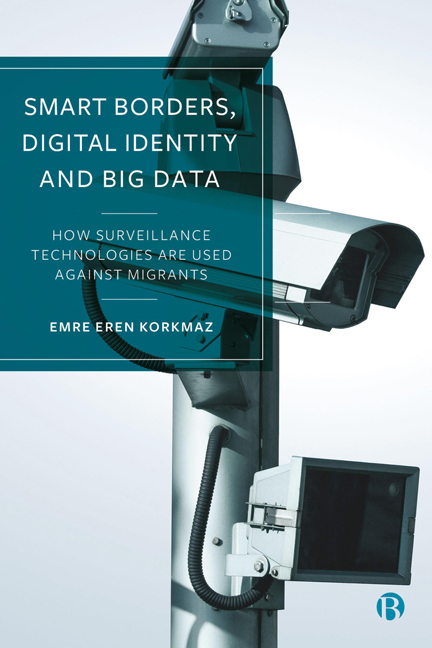 Smart Borders, Digital Identity and Big Data
Smart Borders, Digital Identity and Big Data Book contents
- Frontmatter
- Dedication
- Contents
- List of Abbreviations
- About the Author
- Acknowledgements
- Introduction: Canaries in the Coal Mine
- 1 Migration and (Surveillance) Capitalism
- 2 Migration and (Big) Data Analysis
- 3 Smart Borders
- 4 Digital Identity and Surveillance Capitalism
- Conclusion: How Can We Resist?
- Notes
- References
- Index
Introduction: Canaries in the Coal Mine
Published online by Cambridge University Press: 27 March 2024
- Frontmatter
- Dedication
- Contents
- List of Abbreviations
- About the Author
- Acknowledgements
- Introduction: Canaries in the Coal Mine
- 1 Migration and (Surveillance) Capitalism
- 2 Migration and (Big) Data Analysis
- 3 Smart Borders
- 4 Digital Identity and Surveillance Capitalism
- Conclusion: How Can We Resist?
- Notes
- References
- Index
Summary
We are living in a time when technological transformation permeates all areas of life and affects radical change. Private companies, state actors and academic institutions are in fierce competition among themselves, fostering rapid progress in fields such as artificial intelligence algorithms, digital platforms, the internet of things, blockchain and quantum computers, and, as a result, new products are being produced on a daily basis. The future trajectory of this change, the problems it creates, the inequalities it generates, and the winners and losers of this process, among many other issues, have become significant topics of interest.
On the one hand, more and more people are enjoying the benefits of new technologies as they become cheaper and widely accessible. We have become better informed about the world, have more opportunities to socialize, embrace new business opportunities and generally navigate the world with confidence. We rely more than ever on our phones and computers to live, stress about our batteries draining and feel compelled to check our devices throughout the day. On the other hand, trust in traditional institutions has been shaken because of disinformation, fake news, algorithmic discrimination and cybersecurity concerns.
It is in the context of the issues described in this book that migration and border management are such key areas of investigation. Indeed, it is now much more difficult to come up with alternative legal solutions and identify or prevent discrimination or errors with potentially lethal consequences for migrants or asylum seekers. This is partly a matter of risks and problems brought about by automating a corrupt and discriminatory system.
While there are arrays of technological products that we cannot see (satellites), notice (internet of things, mobile phone social media analysis), influence (machine learning) or even understand (blockchain) which improve our lives, these coexist with technologies that make life more difficult; hampering and ignoring our ability to assert autonomy and make decisions. Indeed, there is a deep anxiety regarding our world in 20 years’ time, as a result of technological advances and transformation – often reflected in utopian or, more commonly, dystopian works of art and media.
- Type
- Chapter
- Information
- Smart Borders, Digital Identity and Big DataHow Surveillance Technologies Are Used Against Migrants, pp. 1 - 15Publisher: Bristol University PressPrint publication year: 2024


